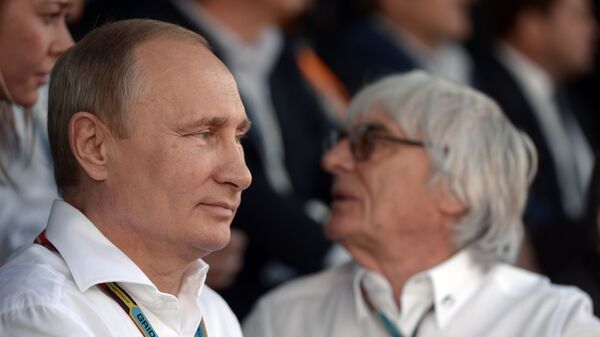In an interview with The Times, billionaire Bernie Ecclestone, former chief executive of the Formula One Group, has heaped praise on Russian President Vladimir Putin, describing him as “a good guy” and pledging to take a bullet for him if necessary.
“If someone had a machine gun and was prepared to shoot Putin I would stand in front of him”, the 88-year-old said, adding that the Russian president has “never done anything that isn't doing good things for people”.
Ecclestone added that he would like Putin “running Europe” and that “he does what he says he is going to do”.
Additionally, the former Formula One boss said that he doesn’t believe in the accusations of Russia’s involvement in the poisoning of Russian military intelligence officer Sergei Skripal and his daughter Yulia in Salisbury, UK in March 2018.
“He didn't do that. He would be too busy to be worrying about that sort of thing. Storytellers make these things up”, Ecclestone underscored.
His remarks come after the Russian Embassy in the UK expressed regret in late May over “the fact that the British authorities continue to [mention] the unproven involvement of Russia in the poisoning [of Sergei Skripal and his daughter]…”.
The Russian Foreign Ministry earlier described the Salisbury incident as part of London’s so-called dead cat strategy that aims to distract Britons from the difficult Brexit process and steer their focus toward the alleged Russian threat.
On 4 March, the Skripals were found unconscious on a bench near a shopping mall in Salisbury. UK authorities immediately blamed Russia for attempting to assassinate the Skripals with what is believed by London to be the A234 nerve agent.
Russia has repeatedly denied having any role in the poisoning, pointing to the lack of evidence provided by London to substantiate its accusations.
Moscow also requested a joint investigation into the Salisbury incident, but was rejected by London, while the Organisation for the Prohibition of Chemical Weapons (OPCW) did not shed any light on who is behind the attack either, with Russian officials referring to the organisation’s report as “formal and empty”.
The Skripal case led to Moscow-London relations reaching a new low, and Russian diplomats subsequently being expelled from a spate of EU countries after the Skripals’ poisoning.


